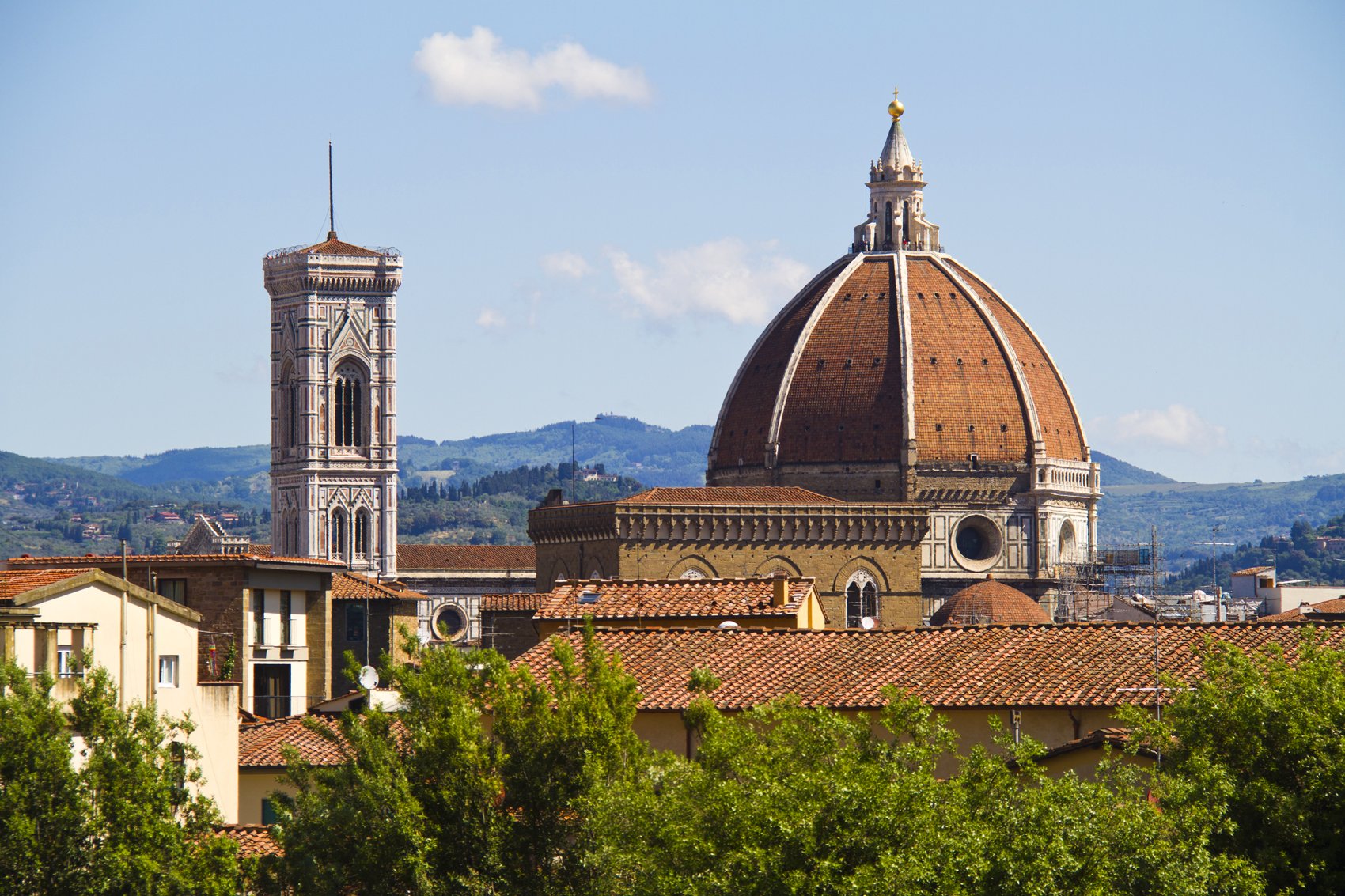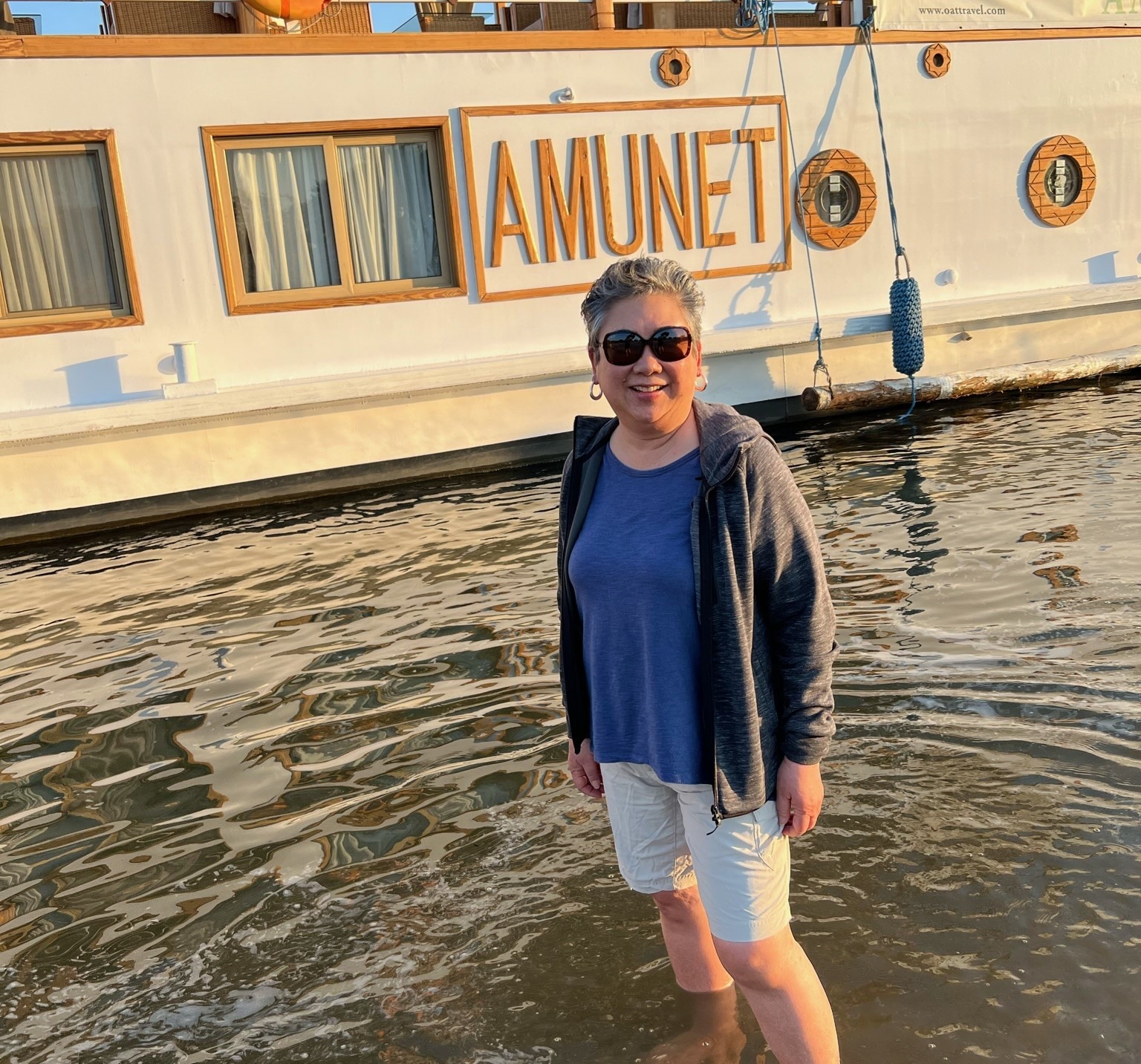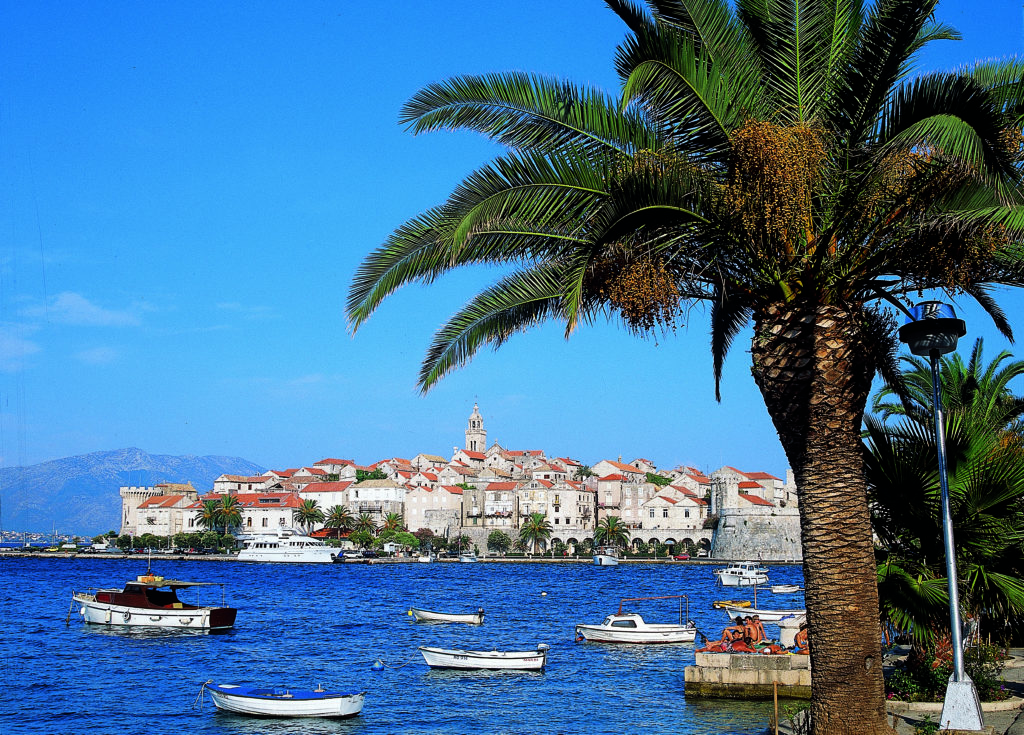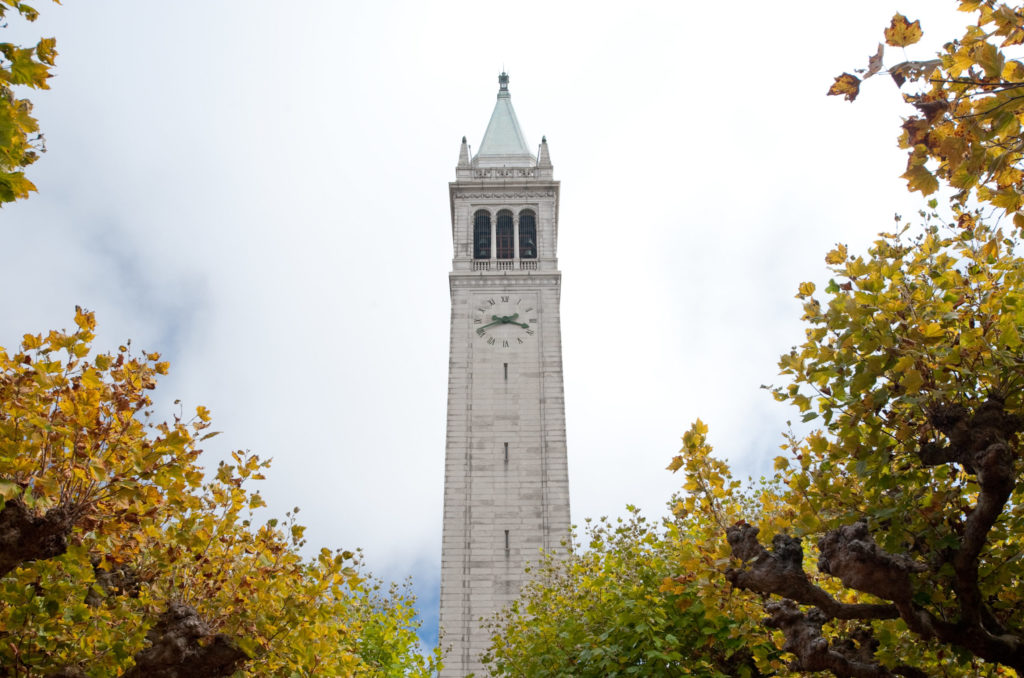If you ask Dianne Fukami ’77 about her life at and after UC Berkeley, she’d attribute much of it to a combination of luck, opportunity, and hard work. A first-generation college student and Alumni Scholar, Fukami found her academic footing in UC Berkeley’s journalism program. That journalism background proved the first step not only for Fukami’s television news career but also for her later work producing documentaries.
More recently, Fukami has brought her energy and expertise to the Cal Discoveries Travel program, where she often lectures on trips. A seasoned traveler, Fukami approaches the trips she leads with a learner’s mentality, using her journalistic research skills to find enrichment experiences that you wouldn’t see on a daytripper’s itinerary.
The Cal Alumni Association interviewed Fukami about how she ended up in journalism, why she’s still so loyal to UC Berkeley, and what it’s like to group travel when everyone has a Berkeley-esque curiosity.
Cal Alumni Association (CAA): Tell me a little bit about your story and your journey to UC Berkeley.
Dianne Fukami (DF): I graduated from high school in ’73 in San Francisco. It wasn’t like now where parents take their kids to different schools and tour and everything. I knew that I didn’t want to go too far from home, so I only put in an application for Cal and to San Francisco State. I had never even visited Cal until my acceptance. It was an on-campus orientation where we could stay overnight. That was my first foray into Cal, and I just loved it. It was close enough so that I could just take the AC Transit bus home if I wanted to. But on the other hand, it was far enough from home that I could get a sense of what else was out there. I had lived a pretty sheltered life in San Francisco, and Cal was a whole new world full of new ideas. The campus was beautiful. New friends. New opportunities. Every year during the fall—seeing the Cal campus and just being in the East Bay makes me sort of nostalgic for what it was like during the beginning of the school year in all the falls the four years that I had been there.
One of the reasons why I love Cal so much is the opportunities it gave me in terms of scholarships. I was an Alumni Scholar [through the Cal Alumni Association]. We came from a working-class family. I was a first-generation college graduate. To get that kind of financial aid when as a high school student you’re scrapping and looking for every bit of help that you can, that was enormously appreciated. [The Leadership Award scholarship] really helped a lot. And so that’s why I remain dedicated and devoted to the Cal Alumni Association, because I was a recipient of their scholarship for the four years that I was here and am really appreciative of that.
CAA: Do you have any favorite memories from those four years?
DF: My best memories of Cal—walking through campus, going through Sather Gate. At the time, all my friends would hang out on the benches outside Dwinelle. You couldn’t walk by Dwinelle without seeing somebody that you knew.
In my first two years, I was just being exposed to so many different things. Like many Asian American parents, my folks wanted me to go into the medical field, you know, or science or something. I was a pretty good student in high school. But boy, taking those pre-med undergraduate courses, I was struggling to stay alive! I realized I didn’t have an aptitude for science or math. I’m not a STEM person. So, I just said, “Forget this.” I started taking English classes and history classes, and I excelled in those. I realized that was my real calling. It was more the humanities and less so the STEM courses. And so that sort of directed me for the rest of my time on campus.
So I applied to the School of Journalism. At the time, the School of Journalism offered an undergraduate program. I was so naive and unworldly that I thought, like any other major, you just fill out an application and you’re going to be accepted. So I did, not thinking that it was a competitive process at all. I didn’t realize how lucky I was to have been accepted until the first day of registration in the fall. I’m sitting there, and this fellow student is sitting next to me and goes, “Oh gosh, aren’t you so excited that we’re in J-School? I have a friend who writes for the Daily Cal and he couldn’t get in.”
It wasn’t until then that I realized how competitive the whole process was. In journalism school, I met some wonderful people and I had wonderful faculty and it really shaped my life. [It was really] being so lucky that really led me down the path where I am. My first love was print journalism. [Three] instructors specifically helped shape my career. One of them was Lacey Fosburgh. She was a lecturer, a former New York Times reporter who unfortunately passed away at a very young age, but she was terrific. She was the beginning writing teacher. There was also Mike Weiss, and then there was David Littlejohn, the former dean at the school—just such a big personality and so passionate about what he was teaching. And I loved those courses. I loved the passion. I loved learning how words matter, and it was just a whole new entrée into a world that I hadn’t really seriously considered before then.
CAA: Tell me more about your journalism career after college.
DF: I had wanted to be a print journalist, and I was a pretty good writer at that point in time. Watergate had just happened, and everybody at school wanted to be the next Woodward and Bernstein. And then it came to be close to graduation time. You’ve got to get a job. I was looking for local jobs: The Hayward Daily Review, The Fremont Argus. I sent in my resume and I didn’t get accepted anywhere. It was tough. But the one good thing was that I was a really good typist: I’m fast, I’m good, I’m accurate. I thought, “Well, I can just get an office job until the right thing comes along.”
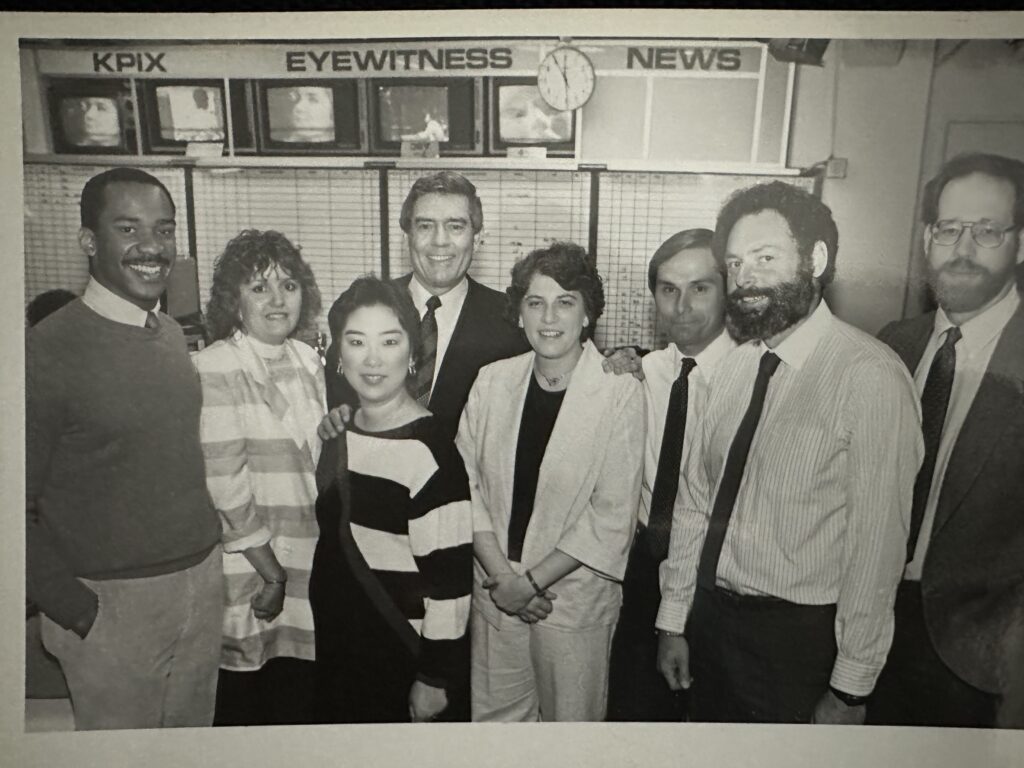
There was a secretarial position at a TV news station in San Francisco, KPIX-TV, and I decided, “Well, sure, I’ll apply for that.” In my mind [I thought], “I’ll do this job for a little while, but I really want a job in newspapers or print.” But I fell in love with TV news. It was so immediate. Back then, we didn’t have the internet. We had teletype wire machines and all the news would come across on these clickety-clack teletype machines. Being a naturally nosy person, I would know stuff before anybody else. Remember, there’s no internet. So sports scores, draft picks, Academy Award nominees, breaking news—I knew that before anybody else, and it was exhilarating.
I spent the next almost fifteen years at KPIX-TV, working my way up, and doing almost every non-union job that was available to me. Never had the desire to be on camera: too scary, I didn’t have the right look, and I didn’t like that attention. But by the time I left in 1991, I was the second-highest person in the newsroom. I was the assistant news director, and for a while, I was acting news director, which is the number one person in the news department. [I was] at the table at many executive meetings where sometimes I was the only woman, and all the time I was the only Asian American. It was a wonderful opportunity. But I couldn’t have done that without the journalism background that I got from Cal.
CAA: So far, you’ve attributed different parts of your life to luck. Was there anything else you found that directed your path?
DF: I attribute a lot of what’s good in my life to luck, but obviously it’s not all luck. It’s recognizing that there’s opportunity. It’s recognizing that the timing is good. It’s taking high-reward risks, and not taking stupid risks. A lot of it is being at the right place at the right time and being ready when opportunity knocks.
And working hard? I worked my tail off when I first started at KPIX. Do you know how some people have five, or ten-year plans for their careers and lives? I was never one of those people. I only wanted to master the job I currently had and only looked to the next step, the next rung in the ladder, not necessarily three or four steps above. That was the story of my career path really. It was just mastering the existing job that I had, looking to see what it would take to get to the next step, and working hard to get that.
It worked for me. I [didn’t think] that you’re supposed to do life goals, five-year goals, three-year goals. I didn’t come from that world. My dad was a car painter, my mom was a housewife. I didn’t have the advantage of a family who would guide me in the way that I was able to guide my daughters because I’ve had more experience in that milieu. I did not at the time.
CAA: And eventually you transitioned to working on documentaries, tell me more about that.
DF: It became increasingly difficult to balance motherhood with that demanding job. I tend to be pretty intense about whatever I commit to. I don’t know how to do it in moderation, just ask my husband. It’s either on or off, but there’s no medium switch. TV news was pretty intense. At the time I left my job, my eldest was four years old, and my younger one was probably about a year old or so. And we’d had some childcare difficulties. At one point, my husband and I looked at each other and we said, “What the hell are we doing? We’re paying a stranger to watch our kids. It’s not optimal.” And it just sort of came to a head.
So I waved goodbye [to KPIX], but I still had consulting work with KPIX for another year and a half, plus my payout. It was a really nice transition and gave me the ability to figure out my next career moves. At the time, I was thirty-five, I was fairly young. My freelance work at KPIX led me to KCSM, which was a PBS station at the time. They asked me if I wanted to do some documentary work for them. And so I was able to do that in addition to doing videos that were fundraising videos for nonprofits, image videos—those kinds of things—and doing some programs for KPIX.
I started working on documentaries also for KCSM, and I had never really considered documentary work as a career move. [And] one thing led to another. Over the years, I must have produced close to a dozen documentaries about the Asian American/Japanese American experience. It was an amazing run. My last documentary was about Norman Mineta, another Cal graduate, that played on national PBS on [May 16, 2019].
CAA: Could you tell me more about the Norman Mineta Legacy Project? How did you get interested in that project?
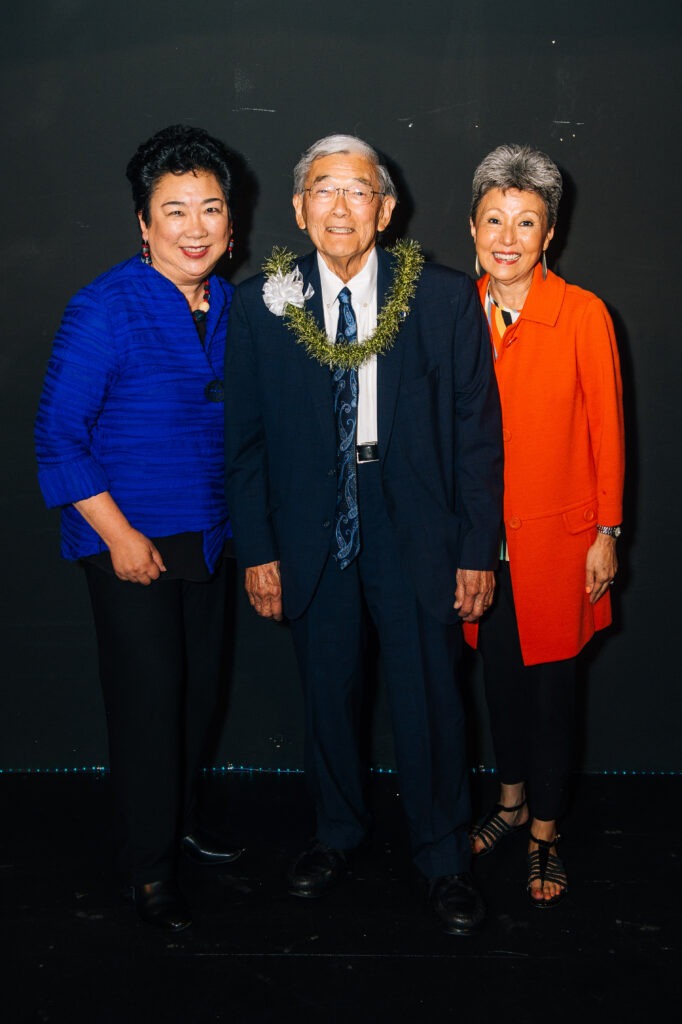
DF: Norman Mineta was sort of an icon in the Bay Area. He was a political leader in the Bay Area before he even went to Washington. But more importantly, he was one of the first Asian American political leaders in the continental United States. He was elected to Congress, selected by Clinton to be Secretary of Commerce, and [was nominated] by [George W.] Bush to be Secretary of Transportation. When 9/11 happened, Norm instituted the TSA. But even more significant to me is that after 9/11—there was so much fear. It was sort of wartime hysteria, and that’s the excuse that was used to incarcerate Japanese Americans. The possible detainment of Middle Easterners, Muslims, and Arabs was being talked about in the same way that my parents and grandparents were incarcerated during World War II. Norm had also been imprisoned at a Heart Mountain Concentration Camp. When 9/11 happened, President Bush remembered Norm’s experiences. [President Bush told us,] “Norm’s example inspired me. I didn’t want our country to do to others what happened to Norm.”
The genesis for the documentary goes back many years, when I used to see Norm in social and community activity circles. He was so approachable, so friendly. He remembered everybody’s name. He was always like, “Just call me Norm.” He was that kind of guy. After he had left public office, I asked him if he would be interested in being the subject of a documentary. He would always say, “Oh God, nobody wants to hear about me. I’m just a regular kind of guy.” That became a running joke between us. Every time I’d see him, he’d ask me about the family. I’d talk to him and say, “Hey, Norm, how about that documentary?” And he’d respond, “Nobody wants to hear about me.”
This went on for about four or five years. Then one day, I [asked] Norm, “How about the documentary?” He said, “Let’s talk.” I wasn’t prepared for that at all! One thing led to another, and he agreed that we could document his life. And then I said, “Now that you’ve finally said yes, there are going to be a number of documentarians who are more experienced, more talented, than I. Maybe you want to put this on pause so you can look at your options out there.” And he looked at me and my production partner, Debra Nakatomi. He said, “No, I’ve got my team here. I’m good with this.”
When it was finished and it went on PBS, Norm was able to see and get the accolades that he so richly deserved. It’s like going to a funeral while you’re still alive; everybody’s talking nice about you and everything. Norm got to experience this wonderful public feedback from friends, family, strangers, and admirers. More importantly, other people in America got to see this enormous contribution from an individual who had been incarcerated as a ten-year-old boy, just because he was Japanese American, and had grown up to be this incredibly generous public servant.
“I have a deep loyalty to institutions and to people who have invested in me. Berkeley invested in me. I’m in a position now where I can give back and I’m happy to do so.”
Dianne Fukami ’77
CAA: And on top of doing all those different things, you still managed to find different ways to stay involved with UC Berkeley and the Cal Alumni Association. That’s pretty amazing.
DF: I don’t know whether it’s my personal upbringing and sort of credo or an Asian thing, but I have a deep loyalty to institutions and to people who have invested in me. And Berkeley did do that for me. Berkeley invested in me. I’m in a position now where I can give back and I’m happy to do so.
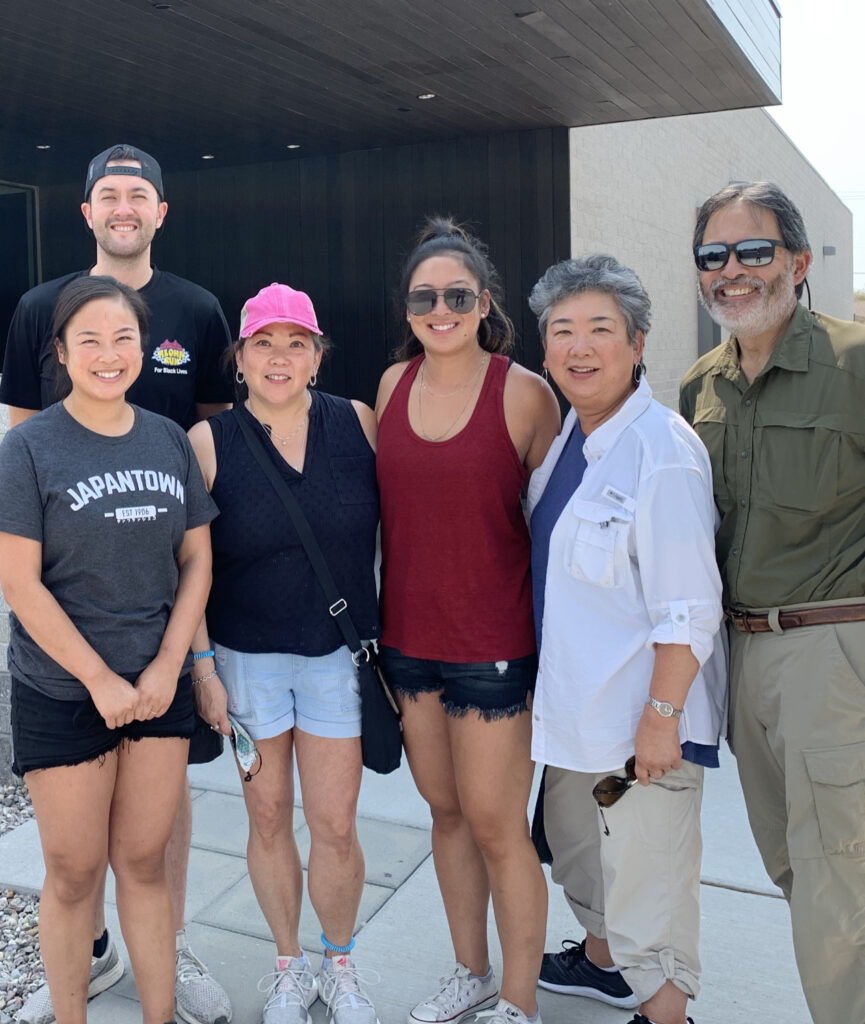
[In high school] I knew that I would have to find my own way to get through college. My parents were not wealthy. First-generation college, as I told you. I would write down all the different institutions that offered scholarships in hopes of being able to finance my college education. I knew, worst came to worst, we could take out a family loan, but I wanted to avoid that for my parents. I was lucky enough to be able to put together a number of different scholarships that basically paid my way through school. But one of the biggest ones, the most steady and dependable, was the Cal Alumni Association’s scholarship. During my time on campus, I stayed in one of the co-ops because it was cheaper than a dorm. and I worked half-time doing clerical work at UC Extension. So [The Leadership Award] was really a lifeline and just eased the financial pressure off of me so much. And I never forgot that.
And my husband’s a UC Berkeley graduate, too. We both really believe in the UC system. One [of my daughters] went to UC Santa Barbara, the other went to UC Davis. For them, it worked out really well. [My daughters] had loved Cal at a young age because we used to buy season basketball tickets, and they’d grow up [going], “Go Bears.”
CAA: How do you stay involved with and give back to UC Berkeley and the Cal Alumni Association?
DF: Well, I would like to have been a little more active. But I’ve tried. My husband and I just got a thank-you note from Berkeley. We didn’t realize this, but we’ve been donating money for over thirty-five years. And we thought, “We make a donation to Cal every year, but we didn’t think we were doing it for so long!” But I guess when you’re old, yeah, thirty-five years. When the hell did that happen?
From time to time, I try to stay active at the J-School with alumni. I’m also a member of the Japanese American Women Alumnae of UC Berkeley. But more recently, the Cal Discovery Travel program—it’s just been amazing. I just feel like I’m the luckiest person in the world. In February 2024, I’ll be [lecturing for] a Cal Discoveries Travel tour to Bali, Thailand, Singapore, and Cambodia, and I’m very excited about that.
CAA: How did you get involved with the Cal Discoveries Travel Program?
DF: A friend of mine had worked on campus and she said to me, “Dianne, would you be interested in being a lecturer on the alumni trips to Japan?” I’d filmed a number of documentaries in Japan.
I had an interview opportunity at Cal Discoveries Travel and told them a little bit about myself. Gave them a résumé. And then I told them a story, and the story was this: You know how when you go to Japan, it’s very much of a shoes-off kind of culture? You take your shoes off when you go to somebody’s house, you take your shoes off when you go to a restaurant or a temple, that kind of thing. But I was explaining the whole concept of restroom slippers. Now, when you go to a restroom, there are different slippers that you put on. So even though you might be in your stocking feet or wearing house slippers, when you go to the restroom, there’s a special set of slippers. And [I was] explaining to them about how when you come out of the restroom and you take those slippers off, you have to replace them in exactly the same way that you had found them.
And why it is that way: you replace them so that the next person who uses them just slips into them. In our country [the United States], it’s kind of haphazard, right? You finish using something and you kind of toss it, but it doesn’t have to be so nice. It doesn’t have to be so neat. And usually, it’s not so considerate of the next user. But in Japan, that’s really important. I was explaining to them how something like bathroom slippers is so reflective of the whole cultural philosophy in Japan, in terms of hygiene and being sanitary, in terms of consideration for the next person or other people. And they were enchanted by that story.
I did my first three trips for Cal Discoveries Travel to Japan. The first two were land trips, and then the third one was a cruise. I loved being able to meet with Cal alumni. You don’t have to be a Cal alum to be on those trips, but predominantly somebody has a Cal connection. It’s so cool. I was in South Africa with my tour group and we were near the Cape of Good Hope. Somebody in another tour group saw one of our travelers who was wearing a Cal hat or something. As we’re passing, it’s just, “Go Bears.” It’s so cool. Wherever you go, Cal is known. It’s prestigious. People who know just sort of mutter or just shout out, “Go Bears.” And I love that.
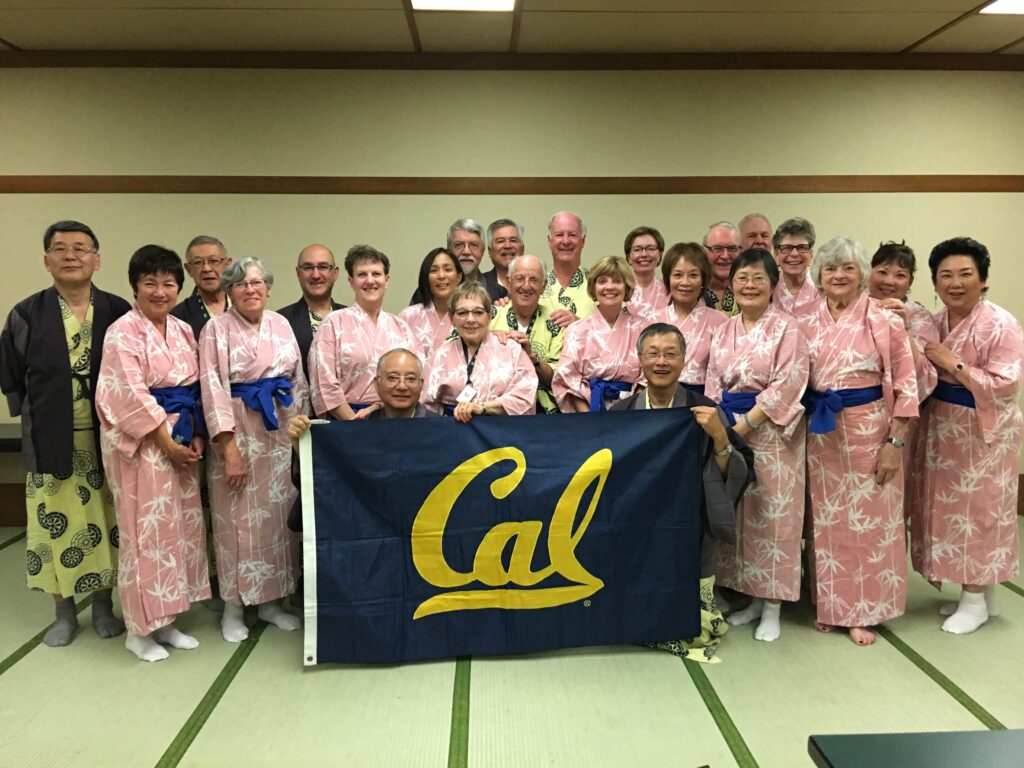
When we travel together, we talk about our times on campus. Most people have different eras that they were there. I’ve been on trips with former professors and they’re so knowledgeable and willing to share their experiences. There’s just been such a breadth of the kind of people who go on these Cal Discoveries Travel trips. Everybody has this natural curiosity. So no matter how old you are or what your background is—I think what Cal has managed to do for so many of us is to awaken, or at least provoke, that natural curiosity that many of us have and that many of us still continue to have no matter our age. So to experience these new things with a group of like-minded people who have a Berkeley sensibility—and you have to have a Berkeley sensibility to have gone to Berkeley—it’s cool. We have this commonality, which is our Cal experience and the wonderful experience that we had at Cal, and that’s very unifying. It’s really nice in a kind of polarized country right now.
CAA: What are some other memorable experiences from lecturing with Cal Discoveries Travel?
DF: I believe many of our CDT travelers are like me: we’re at a certain age where we have more flexibility in our schedules [and] we still have a curiosity about the world and a sense of adventure. I love trips where I can experience new things and expand my learning. When I accompany travelers on the Cal Discoveries Travel trips, I study the formal itinerary very carefully to find ways I can enhance the experience. As an enhancement lecturer, I know that I will never be as much of a subject matter expert on the places that we go to compared to a professor or a local person. Based on my experience with journalism and research, I can find people who can enhance the adventures for us. So for instance, when we went to South Africa, I coordinated two different experiences. I found a restaurateur, a family restaurant that had Airbnb experiences where you could go to their restaurant and you could prepare traditional South African cuisine with them. [The family] would tell you the significance and the symbolism and how to cook all this sort of food. It was breaking bread together with a whole new, different set of cultural tools.
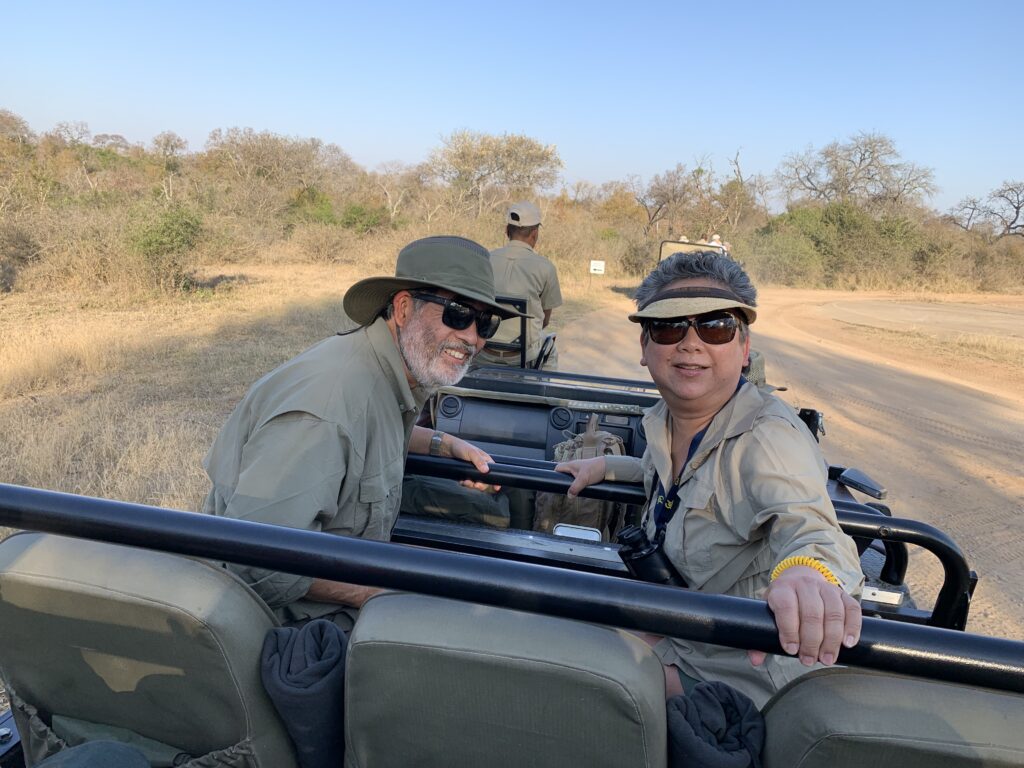
For the second lecture in South Africa, I wanted to explore [more about women’s rights and gender equality]. I asked two women who worked at the animal preserve that we were staying at to talk to us about what it was like to be a woman in South Africa. One was white and one was black. And so we had a fireside chat where the three of us just chatted and the other travelers listened. That was really interesting to hear about gender equity issues in a place where we don’t usually talk about gender equity.
I’m leaving for Australia and New Zealand [with Cal Discoveries Travel] next month. I’ve arranged to have a woman who coordinates indigenous art come in and show us examples. That is an experience that you wouldn’t get just on lectures and day-tripper itineraries. When we go to New Zealand, we’re going to have the opportunity to go to the Māori Cultural Center and learn. But I’m thinking in my mind, “Is anybody really going to talk about equity issues and what it’s like to be from an indigenous group and have been discriminated against for so long, for so many generations?” So I’m working with a couple of people from NZ Māori Tourism, and they’re going to talk to us about equity issues and what it’s like to be Māori.
I want our travelers to think, “Wow, that was really good. Not only was the trip really wonderful, and I got to meet all these fellow Golden Bears, but also I learned a lot. I learned things that I didn’t know I was going to learn about.” So it is an enhancement. Being a person of color in our own country, I know what it’s like when people try to do the racial equivalent of mansplaining. So, why would I try to do that? But my journalism background has helped me learn how to reach out to people who are better in that subject area than I am.
CAA: One last question: what advice would you give to incoming Cal students today?
DF: Be open to every experience that comes your way and appreciate the time that you have at Cal. Try to take advantage of every opportunity. The Cal experience is so much more than one or two things. For me, it opened up a whole new world. I wish that I had experienced more of it. When you’re young, you’re just not smart enough to know! If you’re away from home for the first time, it’s scary to go outside of your comfort zone. But if you’re at Cal, go outside your comfort zone and learn about things.
One of my biggest regrets is that I didn’t [appreciate] the available resources. I took classes with some of the brightest minds in that area of study in the world, people who were at the top of their game in history or in English. I would have had access to those professors if I had known to seek them out. It’s intimidating, but get over that intimidation and experience it. This is a once-in-a-lifetime opportunity to access resources you may never be able to access again.
Cal Discoveries Travel creates memorable learning opportunities for thoughtful, Cal-connected travelers. Find a tour for your next adventure.
How does your Cal experience inspire you today? Share your story with us!



